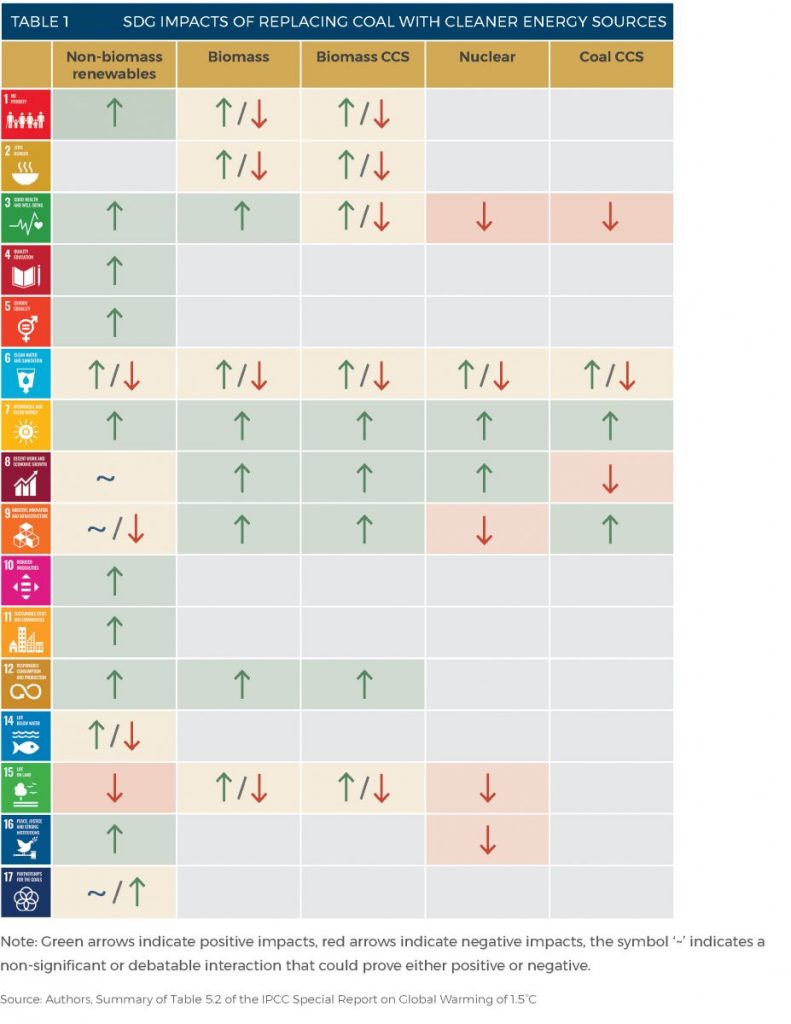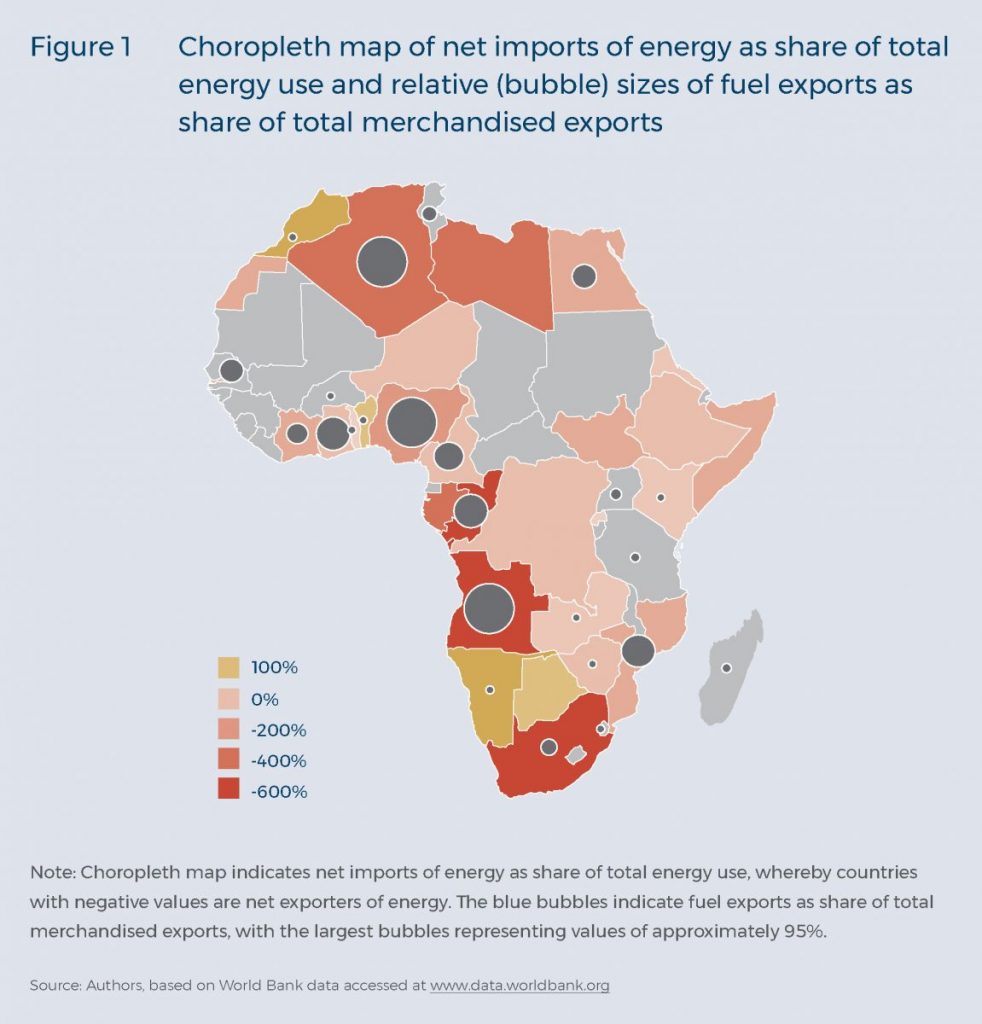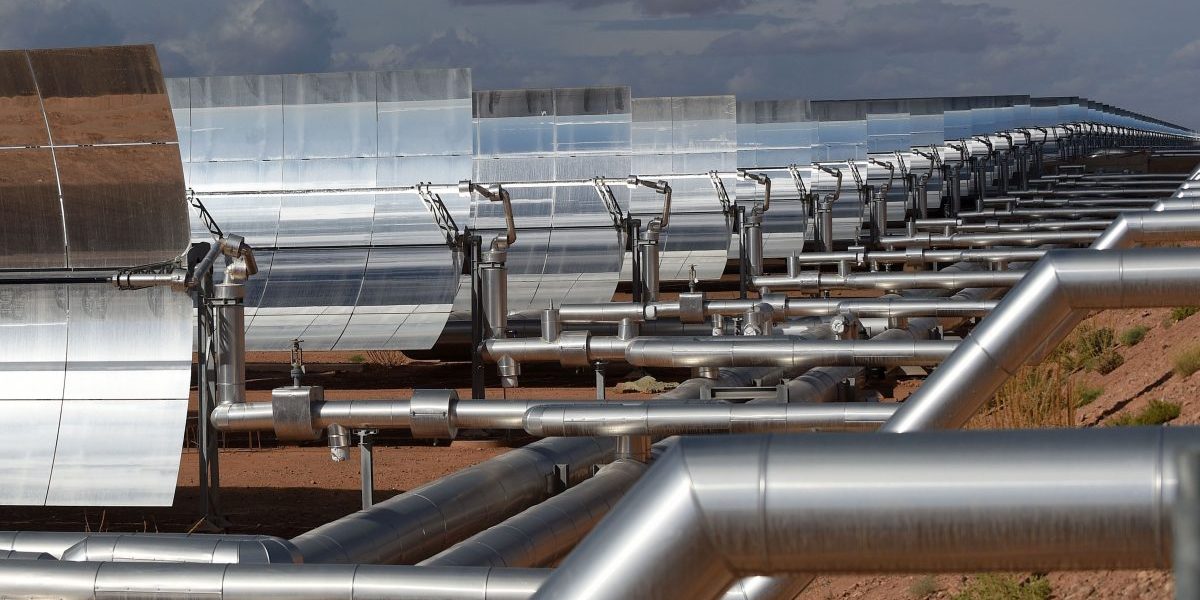Recommendations:
- It is critical that African and European stakeholders work together to formulate a joint African-European vision for a sustainability transformation which should include the establishment of science cooperation and knowledge sharing platforms to find common solutions for common challenges like ensuring a just transition.
- European stakeholders should seek to mobilise investments in green infrastructure expansion in Africa on a large scale, for example, through blended finance.
- To promote buy-in, stakeholders should focus on the economic benefits and job creation opportunities of green transitioning and enable young Africans to gain expertise for highly skilled jobs in renewable energy industries through education and training.
- European and African stakeholders should facilitate clean energy trade through Power-to-X technologies like green hydrogen and direct grid connections for mutual benefit.
Executive summary
The EU Commission has made carbon neutrality its new flagship project. Cooperation on climate change is also becoming increasingly central in the EU’s partnership with African countries. In this policy brief, we argue that an AU-EU partnership on green energy transitions offers manifold opportunities for both regions: for Africa, new job opportunities, increased energy access and revenues through energy trade are possible, while for the EU, green energy demand could be partly covered through cooperation with Africa. Yet, challenges have to be addressed: phasing-out fossil fuels is critical for fossil-fuel dependent countries and the EU is not in the position to demand that resource-rich developing countries keep their fossil fuel reserves unexploited. Instead, it should provide tailor-made incentives through infrastructure finance, technology transfer and education and training. Importantly, diplomatic sensitivity is required and stakeholders should engage timeously to formulate an African-European vision for a joint transition to sustainability.
Introduction
Cooperation for sustainable energy transitions is a central building block for the implementation of the European Green Deal 1European Commission, The European Green Deal, COM (2019) 640, (Brussels: European Commission, 2019).and could support African interests, in particular the AU Agenda 20632AU Commission, Agenda 2063: The Africa We Want (Addis Ababa: AU Commission, 2015).objective on energy. Furthermore, an AU-EU partnership for green energy transition and energy access is a key element in the EU Commission’s proposal for a new strategy with Africa and is likely to be a main topic on the upcoming EU-AU Summit.3European Commission, Towards a comprehensive Strategy with Africa, JOIN (2020) 4 (Brussels: European Commission, 2020).
Africa is a continent that still requires major investments to ensure energy access for all its inhabitants, while at the same time energy demand in the region is on the rise. How this major energy expansion will unfold can have significant implications for both African countries and the rest of the world from an environmental, social and economic perspective. While the world has agreed to move towards sustainable energy, challenges along this path remain and neither Europe nor Africa have so far fully developed tried and tested concepts for a full sustainable energy transition. Hence, manifold opportunities exist for mutual learning and joint initiatives between the regions in the energy sector.
Here, we take stock of key challenges and benefits of a sustainable energy transition in the African context and provide recommendations for possible avenues that an AU-EU partnership could follow to address roadblocks and enable a mutually beneficial transition in both regions. To that end, we explore Africa’s current energy context, the multi-dimensional implications of a sustainable energy transition, and the potential opportunities for trade and cooperation that this transition could offer.
Renewable energy as an enabler for sustainable development in Africa
Africa has the youngest population in the world, with population growth and urbanisation projected to proceed at unprecedented rates. At the same time, the continuing lack of access to electricity and the unreliability of electricity supplies remain major obstacles to development on the African continent. Almost 600 million people (approximately 60% of the population) have no access to electricity and around 900 million lack access to clean cooking, representing the lowest coverage of energy access in the world. Population growth, the expansion of economies and the imperative of increasing grid access will translate into an enormous energy demand across the continent, including for industrial production and mobility. If this demand is not met through renewable sources, the International Energy Agency has predicted that the demand for certain fossil fuels, like oil, by African countries could outstrip that in China within the next two decades.4International Energy Agency, Energy Access Outlook 2019 (Paris: OECD, 2019).
Existing cooperation must be expanded to meet continually increasing energy demand. Moreover, African domestic budgets could potentially derive important revenues through trade in renewable energy with the EU. New Power-to-X technologies open up trade opportunities in that direction. These technologies enable the conversion of renewable energy into various types of synthetic fuels (X) such as gas, liquid methanol or hydrogen, which can be stored and transported to other locations.5International Renewable Energy Agency (IRENA), Innovation landscape for a renewable-powered future: Solutions to integrate variable renewables, ( Abu Dhabi: IRENA 2019), https://www.irena.org/-/media/Files/IRENA/Agency/Publication/2019/Feb/IRENA_Innovation_Landscape_2019_report.pdf.
Renewables for energy access
Many African countries are particularly rich in renewable energy resources – the continent could cover a quarter of its energy needs from domestic and clean renewable energy by 2030, while creating numerous jobs and health benefits.6IRENA, Scaling up renewable energy deployment in Africa: Impact of IRENA’s engagement (Abu Dhabi: IRENA, 2019) https://www.irena.org/-/media/Files/IRENA/Agency/RegionalGroup/Africa/IRENA_Africa_impact_2019.pdfla=en&hash=EECD0F6E8195698842965E63841284997097D9AA.Successful solar energy projects in North Africa (for example in Morocco) show that renewable energy technologies have the potential to provide affordable and clean energy on a large scale. Decentralised renewable energy generation can particularly promote electrification in remote areas. Africa has many constantly sunny areas, such as the Sahara, where the productivity of solar modules is much higher than in Central Europe, as well as good locations for on- and off-shore wind and hydropower energy production.
On the international stage, African countries have already made political commitments to address greenhouse gas emissions in the energy sector: activities in African Nationally Determined Contributions predominantly focus on energy as a main priority.7See NDC-SDG connections tool: https://klimalog.die-gdi.de/ndc-sdg/.Renewable energy, as part of its aspiration for a ‘prosperous Africa based on inclusive growth and sustainable development’8AU Commission, “Agenda 2063”.is also a priority for the first 10 years of the AU’s Agenda 2063.
Low-carbon energy sources have been shown to accrue multiple benefits across all areas of sustainable development relative to fossil fuels, including access to energy in remote areas, air quality improvement, ecosystem protection and resource efficiency, but also economic development and increased employment rates in some cases.9Joyashree Roy et al., Special Report on Global warming of 1.5° C (SR15) – Chapter 5: Sustainable Development, Poverty Eradication and Reducing Inequalities (Intergovernmental Panel on Climate Change (IPCC), 2018). Table 1 indicates that non-biomass renewables have the greatest positive effect on the Sustainable Development Goals, while nuclear and fossil fuel carbon capture and storage have several negative impacts.
However, in spite of the strong political commitment to renewable energy and the multiple benefits they offer, significant differences in energy investments exist between African countries. Moreover, even where substantial progress has been made in terms of policies and projects, as are the cases of Kenya and South Africa, challenges of inefficiencies and inadequacy of transmission and distribution infrastructure in the power sector have limited the uptake of renewables.10Manfred Hafner, Simone Tagliapietra and Lucia De Strasser, Energy in Africa: Challenges and Opportunities, Springer Briefs in Energy (Milan: Springer Nature, 2018).The lack of reliable infrastructure and supply in the power sector further limits industrial development and with it, the demand required for private sector investments. Additionally, human resources and availability of required technologies pose further constraints. On the positive side, the underdeveloped infrastructure puts Africa in a good position to leapfrog towards renewable energy and build its infrastructure adequately from the start, avoiding the challenges faced in many developed regions in integrating renewables in systems that were fully built around fossil fuels.
Given the strong political commitment and potential for renewables in Africa, the EU should step up its ambition to fill existing investment needs and support the African transition through adequate infrastructure investments, technology transfer and capacity building. Moreover, private investments in this sector should be mobilised on a large scale and more ‘democratised’ energy access and production, whereby communities hold a share or full ownership of renewable energy generation, should be supported. These approaches would enable a growing independence of African countries from donor funding over time. The EU has policy instruments at hand to facilitate this, for example through blended finance.

Trade of renewable energy with the EU
As national needs for electricity access are increasingly met, renewable energy production could become a source of revenue for African countries through exports. A central role could be played by the so-called Power-to-X technologies, for example the production of green, exportable hydrogen through renewable energy. Several EU member states are currently developing plans for a higher use of hydrogen fuels as an option to reduce greenhouse gas emissions. To that end, Germany has already released its national hydrogen strategy and plans for significant investments, including EUR 2 billion (nearly $2.4 billion) for international cooperation. Moreover, the EU itself has initiated the development of a hydrogen strategy to support the European Green Deal and envisions opportunities for international cooperation.11European Commission, A hydrogen strategy for a climate neutral Europe, COM (2020) 301 (Brussels: European Commission, 2020), https://ec.europa.eu/energy/sites/ener/files/hydrogen_strategy.pdf.
The EU could facilitate its own clean-energy transition and support African economies through trade of renewable energy. Nevertheless, we argue that for ethical reasons, the expansion of electricity access on the African continent should be prioritised before energy trade. Moreover, measures that address a potential increase in energy prices as a result of increased demand should be considered.
Challenges of the energy transition in fossil fuel dependent countries
Phasing out fossil fuels is politically challenging, particularly if a foreign political framework is seen to pressure states in that direction, as this touches on the highly sensitive topics of sovereignty and justice. But this is the case with the European Green Deal: stricter production related carbon standards and a potential carbon border tax could limit market access of African products to Europe. African countries’ contribution to the global cumulative CO2 emissions is insignificant compared to the EU and against this background, the legitimacy of EU expectations that African countries should abandon fossil-based industrialisation models may be questioned.
While benefits of renewable energy production abound, countries which are already highly dependent on fossil fuels may face significant challenges in undertaking a sustainable energy transition. Currently, electricity production on the African continent is dominated by fossil fuel-based technologies, with a very small share of non-hydropower renewables. In that context, some countries, such as South Africa and Botswana, rely on coal for more than 90% of their electricity production.12World Bank, ‘Electricity production from coal sources (% total),’ https://data.worldbank.org/indicator/EG.ELC.COAL.ZS.In others, such as Algeria, Angola and Nigeria, fossil fuel exports represent approximately 95% of total export revenues (Figure 1). Additionally, some countries, such as Kenya, Uganda, Tanzania, Mozambique and Niger, have recently made significant discoveries of oil, gas or coal and have already started exploitation or are considering doing so.
Nevertheless, phasing out fossil fuels is genuinely in the interest of the African continent as a world region that will face strong negative impacts of climate change and has particularly

low institutional and financial capacity to adapt. Moreover, aside from the multiple benefits mentioned earlier, greening the electricity sector could enhance energy security through diversification and energy independence in those African countries that rely on fossil fuel imports. Economically, a green electricity sector also lowers the carbon footprint of industries and may support competitiveness in a world where environmental standards are ever increasing.
However, important trade-offs in the transition period need to be tackled to avoid constraining other areas of development and to gain acceptance from African partners and stakeholders involved. To increase the incentives for African governments to become more ambitious in implementing a green transition, the EU can pursue different strategies, especially by investing in those parts of the green energy transition which are labour-intensive to stimulate job creation. For instance, low-skilled labour demand could be stimulated through projects that increase energy efficiency in the building and construction sector. Another option would be to invest in education and training for re-skilling of workers from the fossil fuel sector and additionally to enable young Africans to take over high-skilled jobs in green economy sectors. The model of the EU’s Circular Economy Action Plan13European Commission, Circular Economy Action Plan: For a cleaner and more competitive Europe (Brussels: European Commission, 2020).could offer many job opportunities to Africans if it was expanded beyond Europe, for example through the creation of sustainable re-manufacturing facilities. To that end, the Africa-Europe Alliance for Sustainable Investments and Green Jobs14European Commission, Communication on a new Africa-Europe Alliance for Sustainable Investment and Jobs: Taking out investment and jobs to the next level, COM(2018) 643 final (Brussels: European Commission, 2018).proposed by the European Commission in 2018 could act as a support platform for the energy transition. Additionally, the issue of stranded assets may be particularly sensitive and mechanisms such as cap-and-trade (with emissions allowances), or partial tax exemptions or rebates for owners of stranded assets, may need to be implemented.15Adrien Vogt‐Schilb, and Stephane Hallegatte, ‘Climate policies and nationally determined contributions: reconciling the needed ambition with the political economy,’ Wiley Interdisciplinary Reviews: Energy and Environment 6, no. 6, e256 (2017).Finally, as the context of each country is different, approaches should be tailor-made to specific conditions.
Conclusions: A mutually beneficial Africa-Europe energy partnership
The European Commission has made climate action and carbon neutrality its new flagship project. This also translates into a new approach of putting climate partnerships increasingly at the centre of its cooperation with African countries. The EU knows that it cannot achieve the goals of the Paris Agreement by itself and that it needs international partners. The AU, with its young population and abundant potential for green energy, is a natural partner for the EU in the transformation to sustainability. However, this needs to be approached sensitively at the political level. The current discourse around the Green Deal resembles, at least partly, post-colonial rhetoric, whereas the historical record of the EU’s emissions does not legitimise it to demand stronger CO2 mitigation from African countries. While a green transition is in the interest of both Africa and Europe in the long run, it is a matter of appropriate diplomacy and creation of mutual benefits for this AU-EU potential to be manifested. The EU should, to this end, engage with its African partners timeously to develop a joint vision and narrative around a sustainability transformation.
The EU and Africa have a long history of cooperation and prioritisation of the energy sector. The Abidjan Declaration of 2017 16AU-EU, Investing in Youth for Accelerated Inclusive Growth and Sustainable Development, AU-EU Declaration from the AU–EU Summit 2017 (Abidjan: AU-EU, 2017), https://www.consilium.europa.eu/media/31991/33454-pr-final_declaration_au_eu_summit.pdf.reiterates a strong commitment for implementation of the African Renewable Energy Initiative. Moreover, it acknowledges the need for a deepened strategic cooperation through the AU-EU partnership and, amongst others, agrees to launch a partnership on climate and sustainable energy to boost innovation and knowledge exchange. A partnership for energy transition and energy access is one of the five partnerships proposed by the EU Commission for a new comprehensive strategy with Africa to be discussed at the next EU-AU Summit.
Cooperation on energy transitions has the potential to accelerate the transformation of AU-EU relations from dependency to real partnership. Both regions face the challenge of managing just transitions in their countries and developing sustainable societal models, and this presents opportunities for knowledge exchange. Moreover, the partnership should focus on sectors in which economic and sustainability benefits align. Green infrastructure and energy production create jobs and open business opportunities. If approached in the right way, cooperation on energy transitions has a great potential to facilitate sustainable development in Africa as well as Europe.
Acknowledgement
This policy briefing has been published as part of a series under the project Partnership for a Green Transition and Energy Access: Strategic priorities for Africa and Europe. The project is a partnership between SAIIA and the Konrad Adenauer Stiftung’s Regional Programme on Energy Security and Climate Change in Sub-Saharan Africa.








